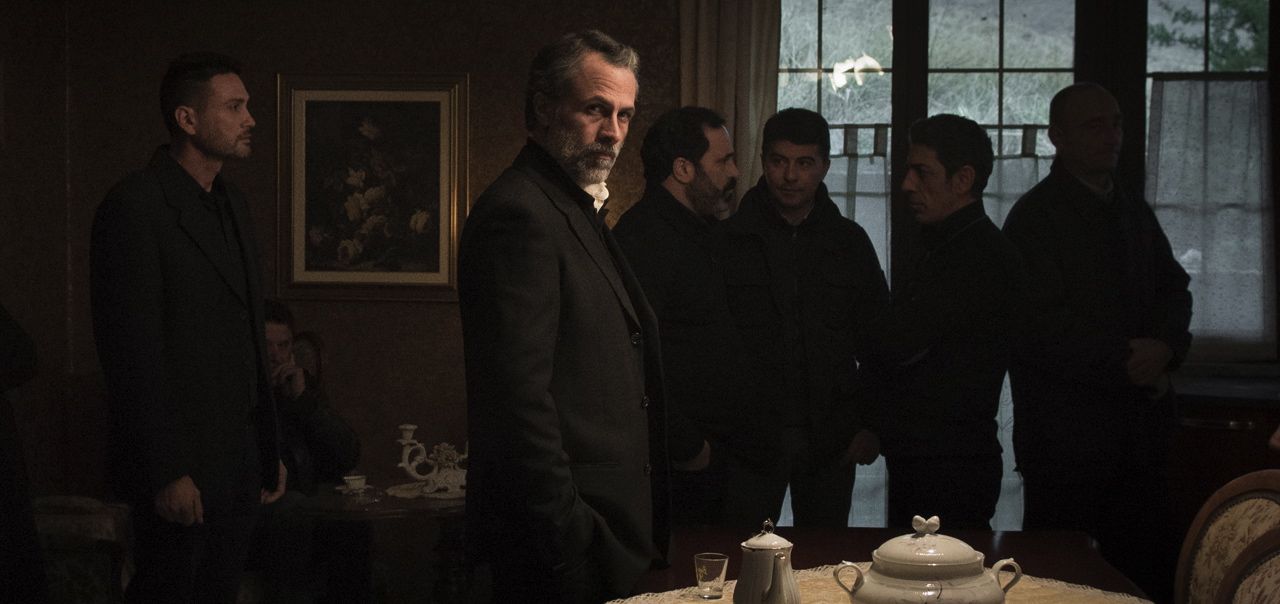
Black Souls won’t be the first or last film about the Mafia, even from an Italian standpoint. Its influence and corrupting power has been documented in Italian cinema in such memorable films as Alberto Lattuada’s Mafioso, the documentary-like films of Francesco Rosi, or recently in the acclaimed Gomorrah by Matteo Garrone. But Francesco Munzi’s film pares back so much from the story – the machinations of the enterprise, (most of) the violence, the spoils, and the effects it has on the local community, especially in the Southern regions of Italy, Sicily and Calabria, and instead delivers a very lived-in, slow-burn narrative about the lives of a family within the Mafia. Constrained to a chronicle of a family in the trade between Calabria and Milan, the film’s sparse script hints at broader issues in Italy, while letting the actors and often stunning cinematography tell a story that moves from character archetypes into something quite different. Deliberately upending audience expectations and desires, the film asserts its own vision and identity through its very unexpected but thematically satisfying final act.
The Carbone clan has three brothers, headed by charismatic Luigi (Australian-born Marco Leonardi, a long shot from his role in Cinema Paradiso). Luigi is the face of the family, his charm and intellect used when working internationally, as with a deal with South American drug syndicates, as well as at home where diplomacy and respect among storied families is a matter of life and death. Rocco (Peppino Mazzotta) could be more easily characterised as the brains, looking over the accounts and logistics from his mansion in Milan, with his elegant wife 1, while eldest brother Luciano (Fabrizio Ferracane) has turned his back on the family lifestyle, content goat-herding on the mountains of Calabria and raising his teenage son Leo (Giuseppe Fumo). Leo, the catalyst for the film, is bored and without prospects on his father’s farm. Seduced by the lifestyle of his uncles, he leaves for Milan but not before youthful antics back in Calabria offend the head of a prominent local family, with whom the Carbones have a precarious truce. Luigi is send to smooth things over, but it appears old rivalries and ghosts of the past emerge once more from Leo’s actions, giving way to a familiar cycle from which it will require drastic means to break free.
It’s the type of film that recalibrates your expectations as you watch it unfold, far closer to a Ceylan-type introspective drama than The Godfather, and from a genre standpoint some will find it slow (there’s no real action for the first hour or so). But neither is it a film of pure talky exposition; the long scenes over the film are interested more in establishing character and mood than explaining the film. The casting and acting are across the board terrific and communicate what the screenplay doesn’t need to; Leo’s restlessness, Luigi’s cockiness and Rocco’s intellect are so clearly embodied by the actors on display that their discussions feel well nuanced, and their relationships and attitudes to each other are so often readable without words, though it’s Ferracane’s Luciano who is the most captivating and intriguing figure; his reluctance to be drawn back in with the family business forming one of the narrative main point of conflict. This slower, character based approach lends weight to the more dramatic scenes, the final act of the film punctuated by narrative revelations and acts of violence, the full effect of which is predicated by our engagement with characters and understanding of the barely drawn out allegiances and plot threads.
Similarly understated are provocative thematic points, alluded to in brief snippets of dialogue but underpinning Munzi’s vision. An early shot of Rocco paying foot-level soldiers draws attention to the foreign sounding names of those enlisted – presumably many are part of Italy’s huge communities of Moroccan and Albanian immigrants. This would be a minor detail of world-building if not looking at Munzi’s body of work more broadly – his previous two films Saimir and The Rest of the Night were both films explicitly concerned with immigration and the paths that led Italy’smigrant community into crime, and Black Souls is a continuation of that. Throwaway lines hint at the level of political and clerical complicity in the Mafia’s dealings, and may be setting likewise setting seeds for future projects. The film’s thematic armature is more impressively brought to screen through its visuals, however. Munzi and DP Vladan Radovic opt for a darker palette, finding inky blacks lurking in at the edges of the frames of interior shots, visually reinforcing the title’s ominous indication of the stains connected with the family and this for boding sense of inevitability and inherent fatalism connected with the story of the crime families. The film also captures the gorgeous vistas of the Calabrian hillside, beautify but immense, and sparse. Recalling the visual language Taviani brothers’ Padre Padrone, this empty space is used to show the hopelessness and lack of prospects particularly in early scenes with Leo, wordlessly making us empathise with his desire to escape to Milan to work with his uncles, and on a broader sense how youths are drawn into the mistakes and lifestyles of their fathers. Black Souls is a gorgeous film that will be overly familiar to some, but distinctive in its look and feel and its strong final act positing a response to the world and entrenched culture it recreates.
Around the Staff
| Conor Bateman | |
| Jeremy Elphick | |
| Imogen Gardam | |
| Saro Lusty-Cavallari | |
